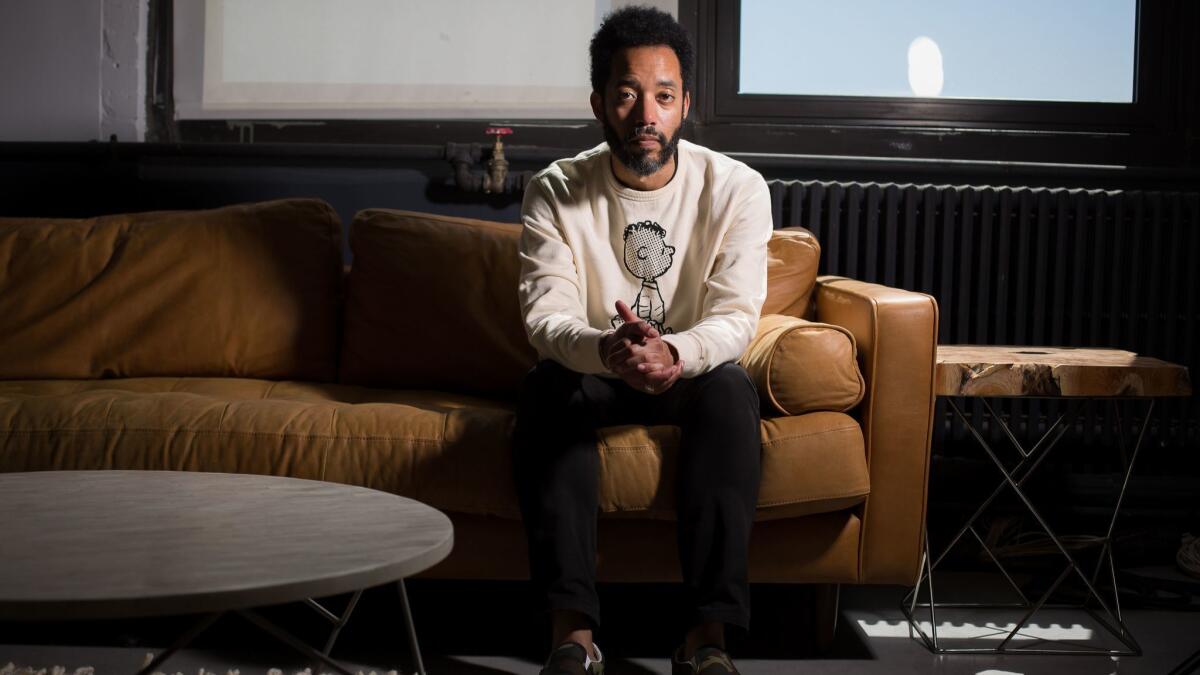Wyatt Cenac returns to political comedy with a unique approach to ‘Problem Areas’ on HBO

Armed with a dryly curious delivery and a keen sense of the absurd, comic Wyatt Cenac was one of the breakout stars among the correspondents of “The Daily Show With Jon Stewart” alongside future late-night hosts John Oliver and Samantha Bee.
Cenac left the show in 2012, and after starring in FX’s sci-fi comedy “People of Earth” as well as stand-up projects and his own web series “aka Wyatt Cenac,” he’s back on the political beat with “Wyatt Cenac’s Problem Areas,” a new HBO comedy series that includes Oliver and Ezra Edelman (the Oscar-winning documentary “O.J.: Made in America”) among its executive producers.
For the record:
12:40 p.m. May 10, 2018For the Record: An earlier version of this story misspelled the name of production designer Maggie Ruder.
“I had wanted to do another topical show, and a topical show that was from my brain,” Cenac said, speaking by phone from his show’s Brooklyn offices, “I had been looking for a way to do it that felt interesting and different and spoke to my voice.”
“Problem Areas” has roots in “The Daily Show” but doesn’t behave like any other late-night series. Cenac begins the show approaching topics from a cozy, wood-paneled set that appears recovered from PBS circa 1978. Rather than mining the day’s news for material, “Problem Areas” dives into social issues with a mix of documentary-style expert voices and field reports. Cenac approaches multiple community residents and leaders with an inquisitive approach that often yields as much a sense of humanity as humor.
With each episode carrying a central exploration of the role of police in America, “Problem Areas” recently turned its attention to Los Angeles; the second of two episodes set in the city will air May 11.
We talked with Cenac about his new show and life after “The Daily Show.”
“Problem Areas” seems to have a broader approach to political issues than other comedy shows. Was that your goal?
It was. I think with any topical show it’s very easy to find yourself caught up in the news cycle, and working at “The Daily Show” I definitely found myself in that, where we would be talking about the last 24 hours. With something like this, it felt like: Could I do a show that didn’t get so caught up in having to react in those ways?
You’re not as much tied to whatever our president did the other day, which must feel freeing.
There’s so many shows, whether it’s “Last Week Tonight” or “The Daily Show” or “Full Frontal” or “Late Night With Seth Meyers,” that are really doing great stuff talking about what’s going on in the world and what’s going on with the president, and those stories that everyone winds up talking about, whether on social media or in their jobs.
A lot of the issues that we wind up talking about in the show are things that are part of the national conversation, but the national conversation doesn’t always include the fact that with some of these things — like something like policing — a federal law may not be able to do something for every city or state in the country. Sometimes there’s change that can happen within a city with residents coming together, talking to and working with the legislators in their community to try to make something better or make something different. That became fascinating.
Do you come away from these episodes feeling more hopeful or less? Because they don’t seem to have really a clean answer.
It’s true. I think for me I find ... that I walk away with a little more clarity. I don’t know if clarity and hope go together, but I do think that having clarity, having a little more understanding on things, it does on some level make me feel like, “OK, these things maybe aren’t as intractable as sometimes the rhetoric can make them seem.”
What made you want to bring the show over to L.A. and tackle the homelessness issue?
Having lived in L.A., I watched a little bit of what was going on as downtown L.A. was starting to get redeveloped and what that meant for people who were living in that area who weren’t getting resources. I remember stories of homeless people or even people who had been found dumped by hospitals in skid row. If you’re going to talk about homelessness and you’re going to talk about it in this country, L.A. and skid row feels like a place that made the most sense for us to talk about some of those issues.
With all your episodes, there’s a documentary-like structure with voices like activists and former police officers onscreen as well. How did those come together?
When we started talking about the show, one of the things that I had thought about was always having these talking heads, because I felt like what I’d like to do is create some sort of a dialogue between experts who can speak to these subjects more than I can. I could run off a bunch of stats, but there’s something that’s very different about actually hearing from individuals who have both a vested interest in these stories and in the subject matter, but also want to do it in a rational discourse. What I didn’t want was pundits, and I didn’t want to create some sort of pundit puppet show.
Where Ezra became very helpful was he was a big proponent of “Talk to some of these people before you go out and shoot things, and see what they say that may inform a possible story that we want to tell.” There were some elements of that where in doing some of those interviews it shaped what we thought about.
For what is a comedy show, you’re addressing issues that often are not looked at with this amount of depth by news networks. Has that realization struck you as well?
It’s interesting, because in building a show like this we have a research department. We have journalists who have chosen to work with us on this show and in this endeavor. I think for us in building this, while we’re making a comedy show, we know that we’re talking about real things. Being able to have that journalistic eye in what we’re doing, it’s necessary and it’s needed.
Political comedy shows seem to be evolving that way as well, of being able to own the fact that you’re dealing with very serious issues, so it requires a couple extra levels of detail.
I think with these shows, with “Last Week Tonight,” with “Full Frontal,” I think as these shows have evolved we all have research departments now. On “The Daily Show” we had an amazing researcher, Adam Chodikoff. Chods was this guy who was this well of knowledge. As we all moved on to our own shows, I would bet if you asked each of us, we would say, “OK, we all need a Chods.” We all then went out and tried to get our own research departments and have multiple people from multiple backgrounds helping to make sure that we are telling these stories with the respect that they deserve.
After “The Daily Show,” so many shows have since started as well to further what that show has done. Are you all still close?
I can’t speak to and for everybody, but Jason Jones and I will, when we have free time, grab a lunch and catch up. Sam’s usually a little busier with her schedule. Then Michelle Wolf, who has a show getting ready to come out, she and I have known each other for years through stand-up, but then when she went to “The Daily Show,” even though it was with Trevor [Noah], a lot of the same people that she was working with were people that I had worked with. Trevor and I have exchanged emails and knew each other before he came to “The Daily Show.” There is a bit of a network as far as staying in contact and communication with one another.
One thing I wanted to touch on about your show that I love is it looks like a ’70s PBS set. How did that come together?
A lot of that goes to the set designer Maggie Ruder, who did an amazing job. But I think the thought even going in was I want to make a show that gives a nod to curiosity. For me, when I think of curiosity on television, a lot of times my childhood was shaped by shows on PBS that encouraged and embraced curiosity.
Yeah, even the amorphous people in the animated segments remind me of that. They’re comforting somehow.
Yeah. I think if you’re going to start asking questions and be curious, you want to feel safe doing it.
See the most-read stories in Entertainment this hour »
‘Wyatt Cenac’s Problem Areas’
Where: HBO
When: 11:30 p.m. Friday
Rating: TV-MA (may be unsuitable for children under the age of 17)
Follow me over here @chrisbarton.
ALSO:
The second season of FX’s otherworldly ‘Legion’ finds an unlikely home in Los Angeles
Roseanne Barr leaves her Trump-tweeting behind — somewhat — in a stand-up stop in Vegas
More to Read
The complete guide to home viewing
Get Screen Gab for everything about the TV shows and streaming movies everyone’s talking about.
You may occasionally receive promotional content from the Los Angeles Times.






